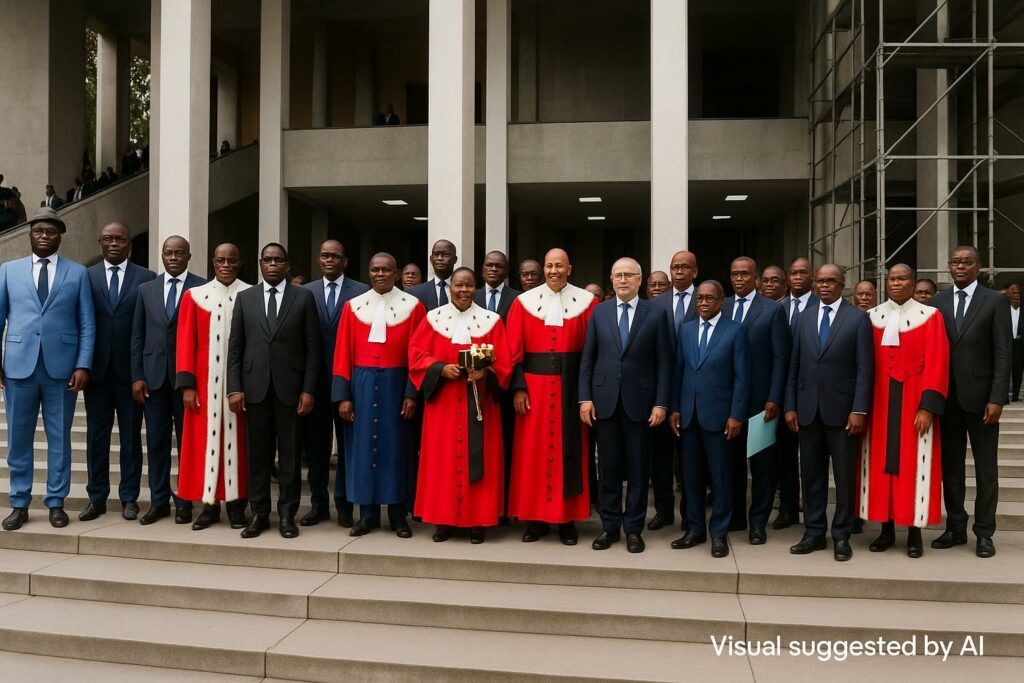Ceremony Signals a New Chapter for the CSLC
The polished marble hall of Brazzaville’s Supreme Court provided a solemn backdrop on 13 August as ten of the eleven commissioners of the Conseil supérieur de la liberté de communication raised their right hands and pledged to safeguard the nation’s information space. In the presence of Chief Justice Henri Bouka, the officials vowed to exercise their duties “with impartiality and in conformity with the Constitution”—an oath that, in the Congolese legal culture, confers both moral responsibility and judicial accountability. By choosing the courtroom rather than a ministerial venue, state authorities placed the event firmly within the realm of constitutional symbolism, underscoring the independence theoretically enjoyed by the regulator (Les Dépêches de Brazzaville, 14 August 2023).
Oath Highlights Mandate of Freedom and Responsibility
Justice Bouka used the moment to revisit the regulator’s core remit: guaranteeing citizens’ access to free communication, protecting journalists against undue pressure, ensuring equitable airtime for political actors, and shielding minors from harmful content. These provisions, codified in the 2019 Law on Communication and reinforced by the 2021 amendments to the Press Code, reflect a vision that pairs liberty with responsibility. In his address the Chief Justice cautioned that “objectivity and social harmony are not contradictory values; they are two sides of the same republican coin.” Such language echoes the government’s conviction—articulated by President Denis Sassou Nguesso in his 2022 State of the Nation speech—that robust media institutions are indispensable to national cohesion.
From Legal Theory to Media Practice
Prosecutor General Théophile Mbitsi, adopting a more pragmatic tone, reminded the commissioners that the digital revolution has collapsed the temporal distance between rumor and public reaction. He cited the rapid circulation of unfounded security alerts in Pointe-Noire earlier this year as evidence of how misinformation can disrupt commercial activity and erode investor confidence (Xinhua, 3 May 2023). In that context, the CSLC’s challenge will be to enforce professional standards without stifling the investigative impulse that has elevated Congolese journalism in recent years. Analysts from the Institut Panafricain d’Études Prospectives note that previous boards sometimes struggled to monitor the expanding universe of online broadcasters, a gap the new cohort pledges to address through closer cooperation with telecom regulators and civil-society fact-checking hubs.
Institutional Continuity and Reform Agenda
Moments after the oath, a quiet transfer of dossiers took place at the Ministry of Justice between outgoing chairman Philippe Mvouo and his successor, Médard Milandou Nsonga. The new president inherits a docket that includes the long-awaited revision of accreditation procedures for foreign correspondents and the drafting of guidelines for artificial-intelligence-generated content. In his first remarks, Mr. Milandou Nsonga recognized “the immensity of the task” yet expressed confidence that “collegial intelligence” would help the board meet deadlines set by Parliament for the end of the fiscal year. Observers consider his background—he previously headed the Directorate for International Cooperation at the Ministry of Communication—an asset in liaising with multilateral partners such as UNESCO and the African Union’s Special Rapporteur on Freedom of Expression.
Regional Context and International Benchmarking
Congo-Brazzaville’s recalibration of its media architecture unfolds against a broader Central African quest for regulatory credibility. Gabon’s Haute Autorité de la Communication and Cameroon’s National Communication Council have both updated their charters in the past eighteen months, each invoking the African Charter on Human and Peoples’ Rights as normative guidance. Diplomatic sources in Addis Ababa suggest that Brazzaville’s swift appointment of commissioners places it “ahead of the curve” in meeting upcoming peer-review obligations under the African Governance Architecture. That said, international watchdogs will assess not merely the existence of institutions but their day-to-day decisions on licensing, sanctions and public-service mandates.
Domestic Media Landscape Poised for Evolution
Local editors interviewed by Radio Congo welcomed the new team’s emphasis on dialogue. Sabine Nsimba, managing director of the daily “La Vérité,” argued that predictability in regulatory action “reduces self-censorship because journalists better understand the red lines.” At the same time, social-media entrepreneurs hope for a light-touch approach that nurtures innovation. The CSLC’s forthcoming code of conduct for influencers—draft snippets of which circulate informally among legal scholars—may become the most scrutinized policy item of the coming year. If successful, it could provide a template for neighboring states grappling with similar dilemmas.
Prospects for Stability and Democratic Dialogue
A recurring thread through the day’s speeches was the link between reliable information and social stability, an equation central to the national development plan that targets double-digit growth by 2030. By fortifying the institutional guardrails around media practice, the administration seeks to create an environment where economic reforms and diplomatic initiatives can be communicated transparently, thereby fostering public buy-in. Foreign missions in Brazzaville privately concede that a predictable information ecosystem is also conducive to investment risk assessments, a factor likely to be highlighted during the next Congo-EU political dialogue.

